Comments
ERIC PREVEN’S NOTEBOOK - It started with Olympic fluff: LA28 strutted into City Hall, flashed a glossy slideshow they called “legacy,” and vanished before the questions got inconvenient. When Councilmember Padilla asked how we spent the $4 million extra, the answer—“We served more kids than we thought”—sounded like a Beverly Hills brunch tab. No receipts, just service. Pay up, Los Angeles. Meanwhile, the people actually trying to speak truth? Boxed out.
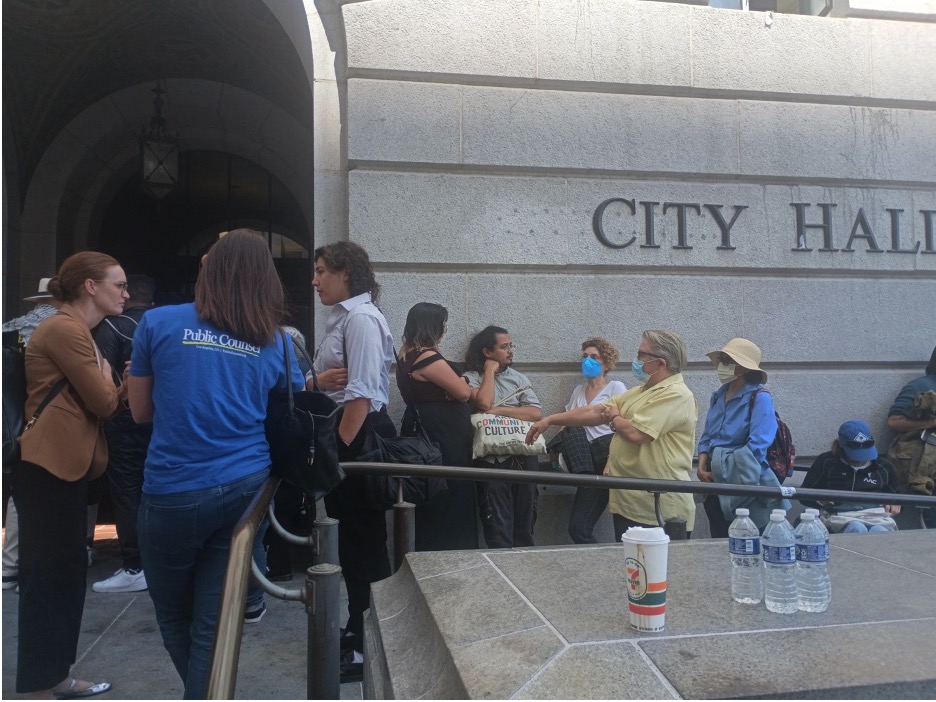
The public came down and many were turned around due to capacity.
On Thursday, Angelenos lined up before dawn to weigh in on the $12.8 billion budget. They got two hours. Then the trapdoor opened.
Council had already altered Item 1, without notifying the public. That’s a Brown Act violation, not a “Best Practices in Transparency” webinar. And when watchdogs filed a Cure & Correct overnight, Council sheepishly admitted it by Friday, without reopening public comment.
Translation? They’ll break the law to silence you. They’re not afraid of crime. They’re afraid of comments.
This has been the long-game strategy under Council President Marqueece Harris-Dawson. First, they eliminated virtual public comment in committee. Then they killed call-ins for full Council meetings. Now, they're slicing minutes off the final budget showdown and cherry-picking who gets a mic.
The justification? They say it's about managing time. The reality? It's about managing dissent.
We’re not talking about a bike lane dispute in Reseda. This is the entire city budget. LAPD alone is getting over $3 billion. Sanitation, libraries, public health, cultural affairs? Fighting over crumbs. But to speak on it? You get sixty seconds.
City Council has learned to weaponize what looks like inclusion. They pack the chambers with curated supporters—AFSCME District Council 36, CHIRLA, EDEPSCA, Physicians for Social Responsibility, the LA Conservancy, and the Domestic Violence Homeless Services Coalition—who deliver polished talking points while keeping critical voices outside.
These groups may have sincere reasons for showing up. But they’re also being used as human bollards. Physical stand-ins to block dissent, whether they realize it or not.
Even if you get past security, your image is algorithmically reduced. Council Rule 93 says cameras must show all speakers equally. But dissenters are cropped, blurred, and shrunk to the size of Bob Blumenfield’s nose. You’re invisible.
So what’s being funded in this Great Erasure Budget?
- $40 million in illegal pension giveaways to LAPD officers who didn’t qualify.
- Major cuts to community services, climate offices, cultural departments, and youth programs.
- Silence.
That’s why three speakers stood out. These weren’t paid lobbyists. Just Angelenos who braved the early lines and cut through the noise.
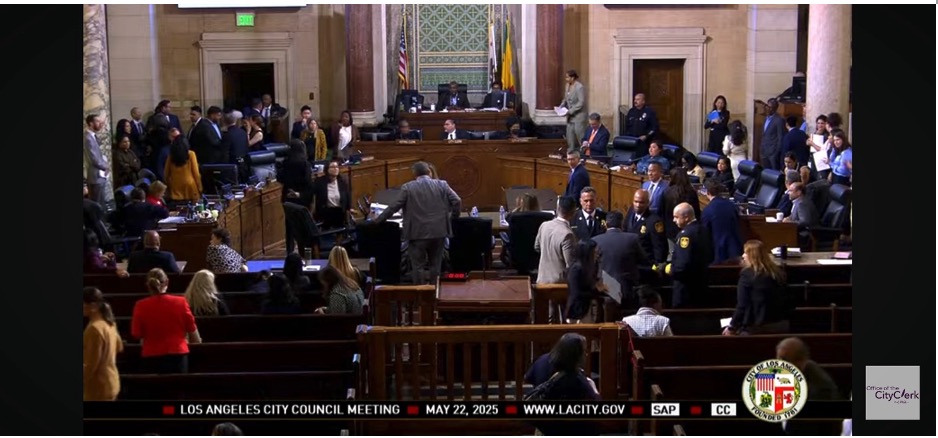
Sneaky CLA, Avak Keothian, who retired in February 2024, is apparently filling a position.
Verbatim, Applause:
Alex Jasset:
“CIMO represents a tiny portion of the overall budget and will more than pay for itself… We urge you to continue to support critical functions… and move toward a more democratic and participatory budget process.”
Susie Vaikuna:
“Susie Vaikuna advocates for the expansion of survivor services funding to stabilize and support those in life-threatening situations. These services are not just important, they are life-saving. Please stand with survivors and approve the full $12.4 million in general funds.”
Smart Speaker 105:
“Any city council member who votes for this budget, unamended, should be voted out… They’re not afraid of crime. They’re afraid of comments.”
These weren’t theatrics. These were pleas.
And on Friday, the Council’s response? A muted apology for the Thursday stunt. They technically conceded to the Cure & Correct letter, announcing a new meeting start time—but offered no path for those who were shut out to come back and speak. So yes, transparency got a technical win. But public comment didn’t.
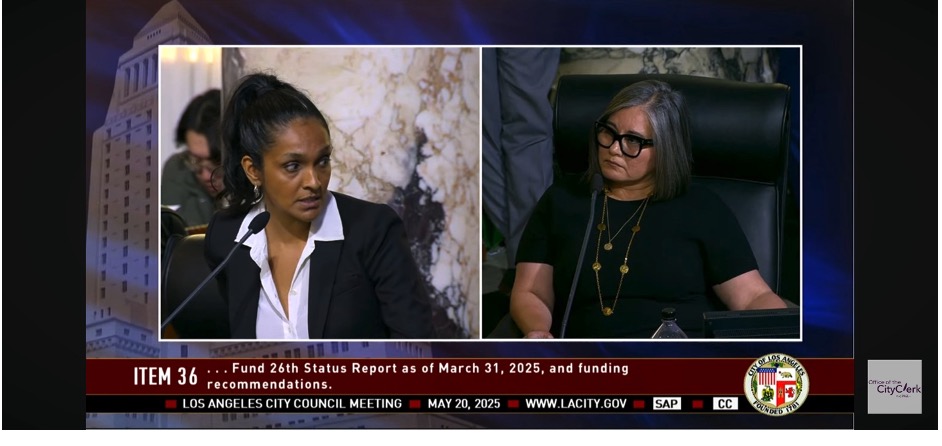
Simmering tension all over... nobody defends the public.
Meanwhile, about those Olympics.
At the Ad Hoc LA28 committee meeting, the room was so quiet it could’ve doubled as a pickleball pilot site. One public speaker signed up, then vanished. Possibly vaporized by a corporate sponsor.
LA28's $160 million PlayLA program claims to have served 225,000 kids. Councilmember Rodriguez asked why small businesses were shut out of the Superbowl. Staff said, “We sent out the RFP. Nobody came.” Padilla asked about a missing $4 million. The answer: “We exceeded expectations.”
Expectations of what, exactly? Repackaging the parks department?
This isn’t France, where 5,000 sports facilities were built ahead of their games. LA’s building “messaging opportunities.”
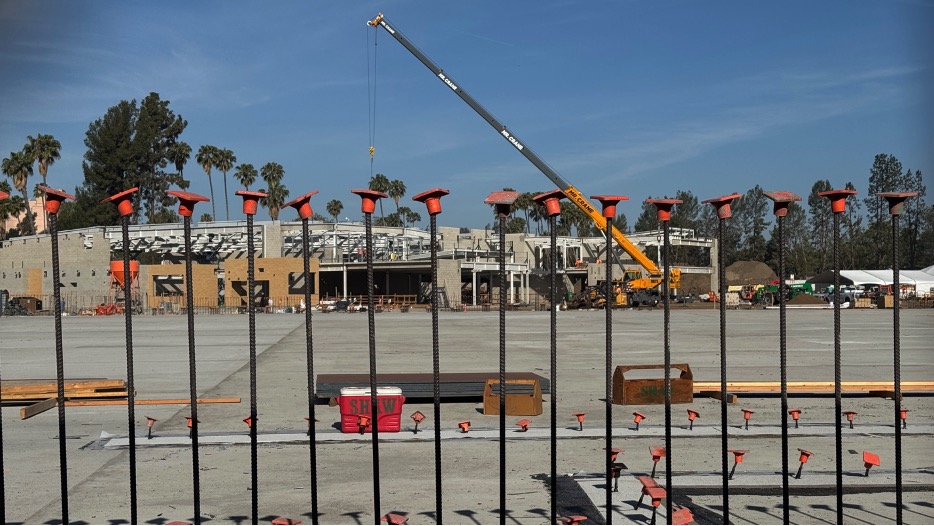
Progress on Harvard-Westlake's Paralympic facility, so, Private Athletic Complex.
Harvard-Westlake is quietly erecting a high-end athletic complex under the “adaptive reuse” banner, while AECOM—the company that literally paid for Eric Garcetti’s mayoral inauguration—is now an LA28 partner. That’s not legacy. That’s ROI.
Picture it: Garcetti, Krekorian, Zev, and Senator Huggy Guy™ reuniting as Team Optics. Their event? Synchronizing deliverables without delivering anything.
This is all happening in a city where it’s easier to get a branded climbing wall than a bus shelter in South LA. One councilmember bragged we’d installed 100 new bus shelters this year—not based on ad revenue, but equity. But when asked how many were covered under Measure HLA, staff dodged. It’s another acronym shell game.
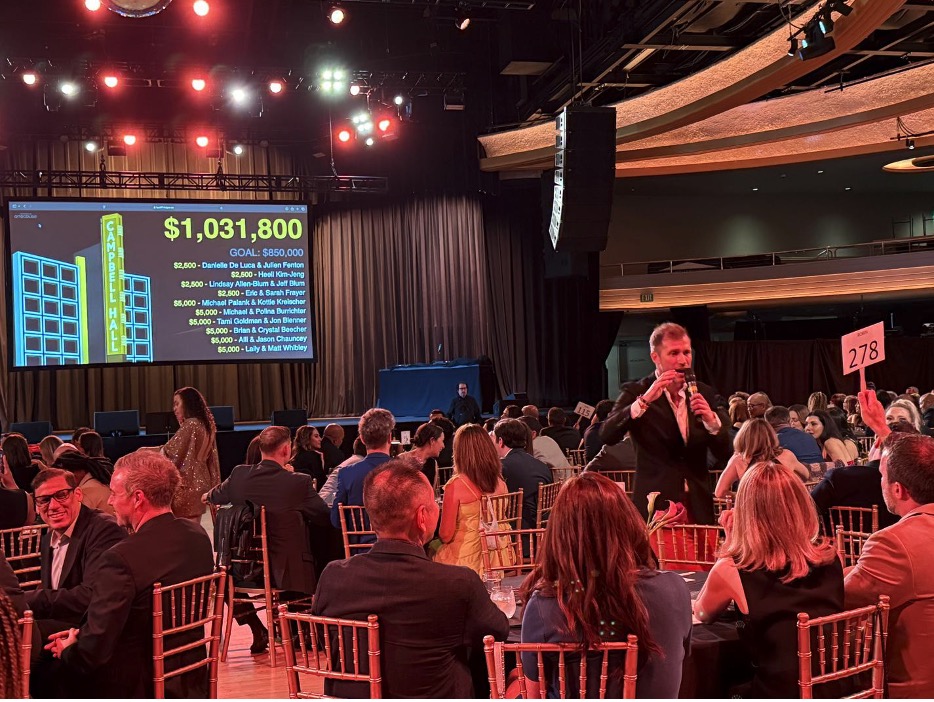
Thank you!
The real legacy?
Your kid pointing to a sunbaked bench and saying, “That’s where I waited six months to enroll in a free sports class.”
So no, we’re not being ungrateful. We’re just not fooled.
This week, LA saw two perfectly staged exhibits: the LA28 mirage and the LA Budget fiasco. One promised future inspiration. The other delivered the current humiliation.
It’s not just fiscal mismanagement. It’s erasure.
And Los Angeles deserves better.
Anonymity Is for the Powerful—Not the Press
When the Morrison Hotel caught fire last December, @AngelenoInsight posted:
“LA is losing its history… another piece of Los Angeles’ past is gone forever.”
Sounds noble—until you realize nobody knows who said it.
I’m Eric Preven. I’ve fought for public records in the California Supreme Court and stood at hundreds of LA County and City meetings—on the record, name attached. Because in LA, corruption thrives on darkness. And anonymous journalism, however poetic, lets the real culprits relax.
Let’s be honest: the people who let the Morrison rot are counting on public amnesia. But it’s not just the Morrison. Just blocks away, LA County quietly signed a $22.3 million lease for office space near MacArthur Park—brokered by CBRE. No debate, no spotlight. A perfect deal… for someone.
And yet, not a word about it from most reporters. When anonymous accounts whisper instead of roar, the insiders win.
Anonymity gets defended as protection:
“It guards against retaliation.”
Sure—but I’ve been yelled at, rolled over, muted mid-sentence—and I’m still here.
“It preserves access.”
Nope. Sources trust people, not handles. My credibility comes from showing up, not hiding out.
“It’s about the message, not the messenger.”
In LA? Please. The messenger always matters. Ask any Supervisor who rolls their eyes when I speak—or any developer who gets nervous when Preven shows up with receipts.
Meanwhile, real people, like my friend caring for three rescue dogs, can’t even call in public comment. They’ve been silenced by policy. And burner accounts won’t fight that. Named advocates might.
So, who is @AngelenoInsight? A well-meaning watchdog? A front for the AIDS Healthcare Foundation, which owns the Morrison? Nobody knows. And that’s the problem.
In this town, anonymity isn’t protection for the powerless. It’s a tactic of the powerful—consultants, developers, insiders. When journalists embrace it, they stop being watchdogs. They become fog machines.
The Morrison burned in the dark. Let’s not let the truth smolder with it.
Put your name on it.
That’s how you fight.
That’s how we win.
The first section was titled: LA Budget Week 2025: You’re Not Invited
(Eric Preven is a Studio City-based TV writer-producer, award-winning journalist, and longtime community activist who won two landmark open government cases in California.)










